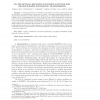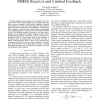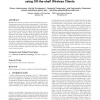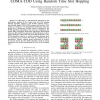85 search results - page 15 / 17 » ARQ Diversity in Fading Random Access Channels |
SIAMAM
2011
12 years 10 months ago
2011
In wireless networks, the channels are often subject to random variations that limit the reliability of communications between any two radios. Geographic transmission strategies ca...
TWC
2010
13 years 2 months ago
2010
This work evaluates opportunistic relaying in the presence of thermal noise as well as interference, when channel sensing is conducted reactively, in slow fading environments. The ...
ICC
2008
IEEE
14 years 2 months ago
2008
IEEE
Abstract—Signature quantization for reverse-link Direct Sequence (DS)- Code Division Multiple Access (CDMA) is considered. A receiver assumed to have perfect estimates of channel...
IMC
2009
ACM
14 years 2 months ago
2009
ACM
WLANs have become an important last-mile technology for providing internet access within homes and enterprises. In such indoor deployments, the wireless channel suffers from signi...
VTC
2006
IEEE
14 years 1 months ago
2006
IEEE
— In this paper, a semi-analytical approach for the performance analysis of the random time slot (TS) hopping (RTSH) algorithm applied to code division multiple access time divis...




